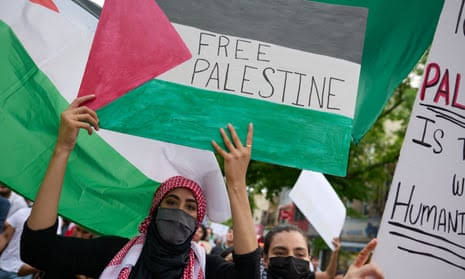In a new and controversial move, TikTok has started flagging the phrase “Free Palestine” as hate speech. This comes after users in the United States shared screenshots of comments being removed for allegedly violating the platform’s community guidelines. The flagging of such a widely used phrase has sparked intense backlash, particularly from pro-Palestinian advocates.
The Incident and User Reactions
On January 21, 2025, American TikTok users began sharing videos and images of notifications from the platform stating that the phrase “Free Palestine” violated TikTok’s hate speech rules. One viral video, viewed over 8 million times, captured a notification that specifically flagged the phrase for “hate speech and hateful behaviours.” Users quickly took to social media platforms like X (formerly Twitter) to voice their frustration.
This move comes at a time of heightened political tensions, as TikTok had been recently reinstated in the US after being temporarily banned due to national security concerns. Critics claim that the removal of “Free Palestine” content might be politically motivated, especially after the platform was scrutinized for its handling of pro-Palestinian posts.
Platform’s Defense and Allegations of Bias
TikTok’s representatives have denied any political bias, asserting that the platform’s community guidelines apply equally to all content. They clarified that content is flagged based on violations of these guidelines, not political sensitivities. “We do not moderate or remove content based on political viewpoints,” a TikTok spokesperson said. However, this explanation has not satisfied many users, who accuse the platform of silencing Palestinian voices.
This controversy has raised broader concerns about censorship on TikTok, especially since the platform has been one of the few major social media outlets that allowed unfiltered pro-Palestinian content. The issue has become even more sensitive following TikTok’s legal battles in the United States, where it has faced increasing scrutiny over its ties to China.
The Political Context Behind the Controversy
The timing of this incident is critical. TikTok’s parent company, ByteDance, has been under intense pressure to divest from the platform due to national security concerns. The US government fears that TikTok might be sharing American users’ data with the Chinese government. On January 19, 2025, the US imposed a deadline for ByteDance to sell TikTok or face a complete ban. However, this deadline was delayed following an executive order by President Trump.
Senator Mitt Romney, in a conversation with then-Secretary of State Antony Blinken, linked the potential TikTok ban to the platform’s support for Palestinian advocacy. He pointed out that TikTok had been a key platform for pro-Palestinian discussions, which he suggested influenced legislative support for the ban. This connection between political pressure and content moderation has fueled suspicion about TikTok’s decisions.
Censorship and the Future of TikTok
The debate over content moderation and censorship has eroded trust in TikTok. Users are now questioning whether the platform remains a space for free expression or if it is being shaped by external political forces. Many are migrating to alternative platforms, such as RedNote, a Shanghai-based app that has seen a rise in American users. These shifts signal growing dissatisfaction with TikTok’s handling of sensitive topics like Palestine and Israel.
The backlash against TikTok is likely to continue as debates about censorship, freedom of speech, and political influence unfold. While the future of the platform in the US remains uncertain, the controversy surrounding its moderation policies will play a key role in shaping its trajectory.
Related Stories:
Turkish president urges Muslim nations’ joint action to halt ongoing Israeli onslaught on Palestine
US Official for Israel-Palestine Affairs Resigns Amid Gaza Conflict
Brazil’s Strong Stance on Supporting Palestine Amid Ongoing Gaza Conflict
















